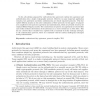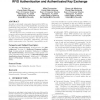138 search results - page 4 / 28 » One-Round Protocols for Two-Party Authenticated Key Exchange |
SP
1997
IEEE
13 years 11 months ago
1997
IEEE
Encrypted Key Exchange (EKE) [1, 2] allows two parties sharing a password to exchange authenticated information over an insecure network by using a combination of public and secre...
ASIACRYPT
2010
Springer
13 years 5 months ago
2010
Springer
So far, all solutions proposed for authenticated key agreement combine key agreement and authentication into a single cryptographic protocol. However, in many important applicatio...
ACNS
2009
Springer
14 years 2 months ago
2009
Springer
Abstract. In the paper “Stronger Security of Authenticated Key Exchange” [1,2], a new security model for authenticated key exchange protocols (eCK) is proposed. The new model i...
CCS
2007
ACM
14 years 1 months ago
2007
ACM
Recently, a universally composable framework for RFID authentication protocols providing availability, anonymity, and authenticity was proposed. In this paper we extend that frame...
STOC
1999
ACM
13 years 11 months ago
1999
ACM
Oblivious polynomial evaluation is a protocol involving two parties, a sender whose input is a polynomial P, and a receiver whose input is a value α. At the end of the protocol t...


